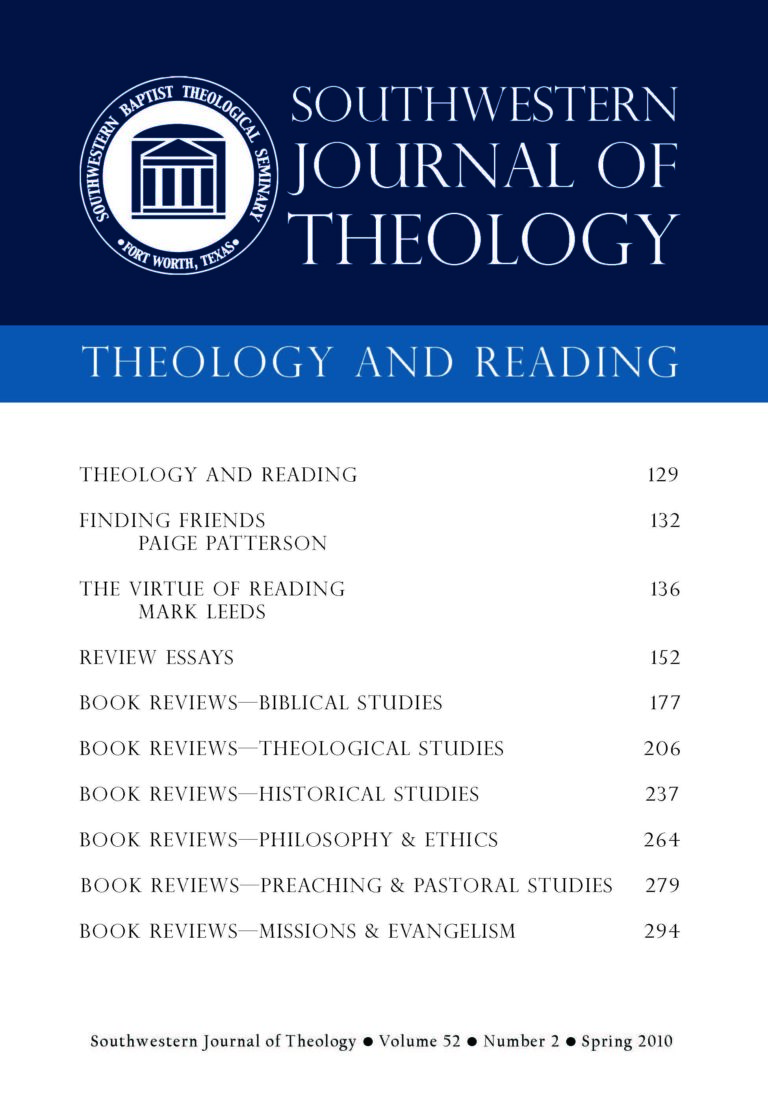
Theology and Reading
Southwestern Journal of Theology
Volume 52, No. 2 – Spring 2010
Managing Editor: Malcolm B. Yarnell III
2nd ed. By Michael J. Dodds, O.P. Washington, DC: Catholic University of America Press, 2008. 275 pages. Softcover, $34.95.
The doctrine of divine immutability has seen numerous challenges in recent years and continues to generate theological conundrums for those seeking to affirm the changelessness of God while acknowledging that he actively demonstrates his love in tangible ways throughout history. In The Unchanging God of Love: Thomas Aquinas & Contemporary Theology, Michael J. Dodds attempts to defend the teaching of Thomas Aquinas on divine immutability from the “bad press” his teaching on the topic has received over the last few decades (2). Dodds serves as professor of philosophy and theology at the Dominican School of Philosophy and Theology in Berkeley, California.
Rather than being a new defense of divine immutability, Dodds’ work is actually more of a summary of the teaching of Aquinas on the topic. Dodds claims that contemporary theologians are challenging “whether an immutable God is truly a God of love” and that Aquinas is the “theologian they most often single out in their critique of divine immutability” (2). In defense of Aquinas, Dodds declares, “In affirming divine immutability, Aquinas reflects the constant teaching of the Church, which from its earliest pronouncements always maintained that the God of love is unchanging” (1).
The structure of the volume provides an interesting approach to the topic of immutability. Instead of starting with the theological and philosophical teaching of divine immutability from Aquinas as might be expected, Dodds begins with a summary of teaching on the immutability of creatures. According to the author, Aquinas uses approximately thirty different terms to describe the immutability of creatures (5). Of course the immutability under consideration for creatures is not the same as that ascribed to God, but Dodds is building a case for a broader understanding of immutability so as to make a case for specific applications to God. In the second chapter, he moves forward to consider the immutability of God by working systematically through the writings of Aquinas and noting almost every text where he mentions this doctrine. Dodds then discusses the sources of Aquinas’ teaching and evaluates the level of authority he assigns to each. He then argues that one must consider the ways of causality, negation, and eminence to understand divine immutability. Dodds acknowledges that human language is inadequate to express the full meaning of God’s immutability, but he does believe that Aquinas teaches something that can be known about this doctrine. He writes, “Far from implying, therefore, that God is somehow static or inert, immutability directly signifies that God, as subsistent esse, is pure dynamic actuality” (159).
Chapter three discusses the idea of attributing motion to the motionless God without subverting the doctrine of immutability. In this chapter, he recounts Aquinas’ teaching on the Trinity, creation, providence, and the incarnation. In each of these areas, Dodds discusses how Aquinas can affirm some kind of motion or action without denying immutability. For example, in the area of providence, he deals with the problem of immutability and prayer. Dodds writes, “To solve such dilemmas, we must deny that prayer is intended to change the divine will and see it rather as a secondary cause ordained by God’s unchanging will. As the ultimate cause of all actuality, God freely chooses to act through secondary causes in accomplishing his will” (188–89).
The final chapter of the book brings the purpose of the book full circle by attributing to God the characteristic of love after fully affirming his immutability. Dodds makes the argument that the “dynamic stillness” (207) of God’s love is perfectly compatible with divine immutability when they are both understood properly. Dodds concludes the work with the following observation of Aquinas’ teaching on divine immutability:
All of Thomas’s major arguments for divine immutability spring from the premises of God’s absolute simplicity, ultimate perfection, pure actuality, and primary transcendent causality. Since those premises are themselves founded in his understanding of God as ipsum esse subsistens, divine immutability in Thomas’s theology indicates not simply the stability and constancy of God’s being, but his dynamic perfection as ipsum esse subsistens—pure “is,” unlimited by any potency. (242)
This understanding of divine immutability allows Dodds to conclude that Aquinas has consistently portrayed an unchanging God of love in his writings.
As a summary of the work of Aquinas on divine immutability, Dodds has provided his readers with an invaluable resource. He has brought together all of Thomas’ major work on the subject and provided a comprehensive index of texts where Aquinas addresses divine motion and immutability. He also provides the theological and philosophical underpinnings for this discussion by bringing other works by Aquinas to bear on this subject.
In contrast, the subtitle of the book portrays the idea that Dodds will deal with both the work of Aquinas and contemporary theologians. Unfortunately, the discussion of contemporary works on divine immutability almost seems to be an afterthought in most chapters. Several references are made to authors who critique the work of Aquinas or who disagree entirely with his approach, but they are limited to brief statements and little interaction.
Despite the weakness noted above, this volume serves as an excellent resource for those interested in the doctrine of divine immutability. It enables the reader to grasp a historical perspective of the teaching from Aquinas and then prepares the reader himself to make application to the contemporary debate on immutability.





